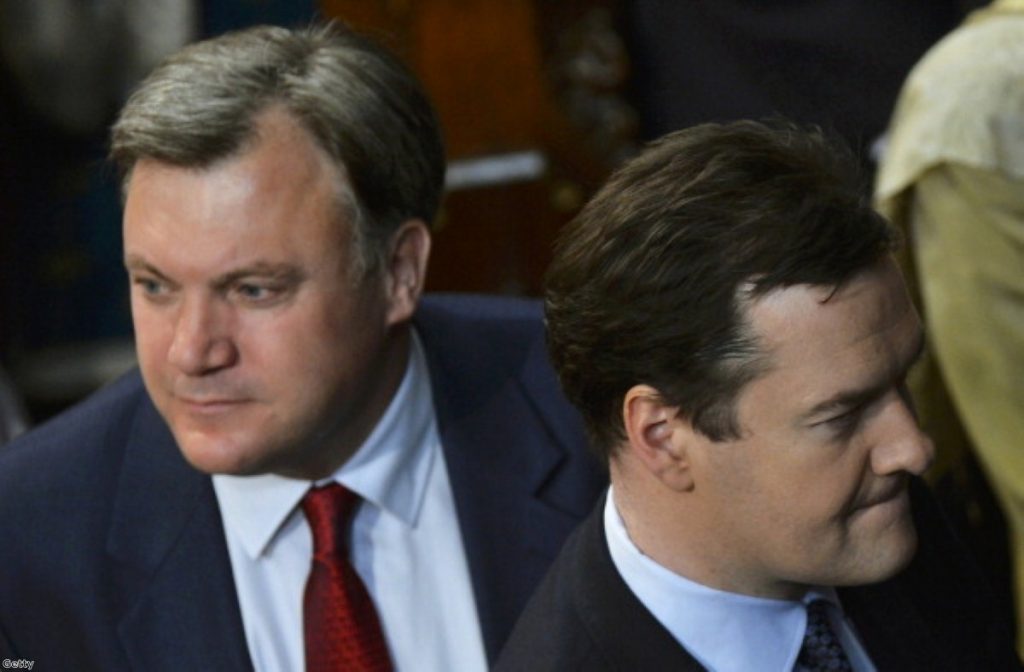George Osborne has a point about Labour’s spending plans
Labour reacted furiously yesterday to documents produced by George Osborne and the Treasury outlining the supposed costs of Ed Miliband's general election spending commitments.
Labour spinners spent much of the day tweeting denials both about the costs of these policies and the suggestion that Miliband or his front bench had even promised these policies in the first place.
"p.44 of Tory dossier says Labour will cancel cuts to the arts budget. We won't," read one typical tweet.
So had the Tory attack completely fallen apart? Well not quite. As it soon became clear, Osborne's claims were based on a "reasonableness test". According to the test:
"Any statement by a Labour frontbencher that a voter would believe to be a promise to spend money or raise revenue if Labour are elected is counted as a commitment. So when a Labour frontbencher proposes spending, or opposes a government saving, the implication to a voter would be that Labour would spend the money or cancel the saving if elected in 2015. The same test applies to revenue-raising proposals."
Labour quickly dismissed this test as a "nonsense". But is it really? Isn't it in fact actually quite reasonable?
After all, Labour have spent the past five years criticising a whole series of cuts by the coalition government at both a national and local level. In London alone, Labour politicians have consistently opposed cuts to accident and emergency services, fire and police stations and London Underground stations.
Opposition to these cuts has formed the basis of their election campaigns while some of these politicians have even joined picket lines against them. Yet when I've asked those same politicians whether they will actually promise to reverse those cuts, they admit they won't. It's clear that if Labour win back City Hall next year, no police or fire stations will re-open and no closed ticket offices will roll up their shutters again.
p.44 of Tory dossier says Labour will cancel cuts to the arts budget. We won't.
— Labour Press Team (@labourpress) January 5, 2015
This pattern is repeated at a national level as well. Both Miliband and his front bench have repeatedly opposed real-terms cuts to local government funding and NHS pay.
Asked last month about the government's decision not to give NHS staff the recommended one per cent pay rise, Ed Miliband said:
"We think it was wrong when the government came along, there was a one per cent rise suggested for nursing staff and others and it wasn't honoured. I think it should be a basic principle that you honour those pay review body recommendations because that is what the public wants and that is what the health service needs".
Any reasonable person hearing Miliband would assume he believes it's a "basic principle" that NHS staff need and deserve higher pay. Any reasonable person would assume that is exactly what Labour plans to do. But when journalists ask whether Labour actually plans to reverse real-terms cuts to NHS pay, they admit they won't.
Responding to Osborne's report yesterday, Ed Balls admitted that:
"I said it was a mistake of Jeremy Hunt to reject the pay review bodies but I also… said I can make no commitment now to find additional money to pay for that. We've talked about the £2.5bn Time to Care fund [to fund new NHS staff] but I think the priority next year for us is going to be putting money into more doctors and nurses rather than pay."
So they repeatedly opposed the cuts while having no plans to reverse them. This is basically dishonest and reveals why Osborne's attack is actually quite smart.
Over the past five years Labour has opposed all kinds of cuts which in reality they have zero plans to reverse. Even worse, as Balls' comments confirm, many of those cuts will actually deepen under Labour.
Of course it's technically accurate to say that if somebody opposes a cut, it doesn't necessarily mean that they are promising to reverse it. But it is also a transparently dishonest approach and explains why so much of the public now don't believe a word politicians say.
How much any of this will impact on the general election result is difficult to say. Osborne's reports and Labour's rebuttals are unlikely to be read by more than a handful of journalists and politicos in Westminster.
But it is what follows the general election that should concern Labour far more. In 2010 the Liberal Democrats suffered heavily because they were implementing so many things they had previously opposed. This basic contrast between the Lib Dem's policies in government and the things they had opposed in opposition caused a fatal wound to their credibility and ultimately their popularity.
Ed Miliband's party now risks a very similar fate in May 2015.
Labour yesterday dismissed Osborne's attack as a "nonsense". In fact they should be taking it very seriously indeed.





-01.png)